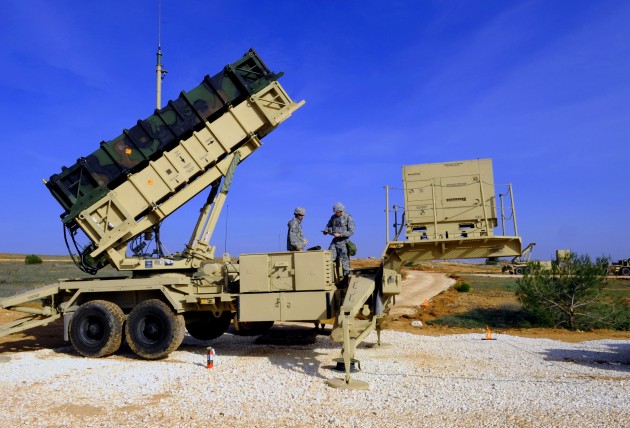Foreign Arms Sales, Sequestration And The Future of Aerospace Companies
Posted on
 PARIS: Every American defense company here wants to sell more weapons to foreign buyers in the Middle East and in Asia as they seek to compensate for flat or declining sales in the United States. Every European defense company wants to sell more weapons to foreign buyers in the Middle East and in Asia as they seek to compensate for flat or declining sales to the United States and to their own governments.
PARIS: Every American defense company here wants to sell more weapons to foreign buyers in the Middle East and in Asia as they seek to compensate for flat or declining sales in the United States. Every European defense company wants to sell more weapons to foreign buyers in the Middle East and in Asia as they seek to compensate for flat or declining sales to the United States and to their own governments.
Someone is going to lose in those competitions between EADS, Thales, MBDA, Raytheon, Lockheed Martin, Northrop Grumman and others. Add to this mix the fact that American companies also confront the painful uncertainty caused by the mandatory budget cuts known as sequestration. The major American companies have conducted detailed reviews of the systems they sell to the US government to assess the likely impact over the next two to three years. Dan Crowley, president of Raytheon’s IDS unit, told me his company — intent on boosting its foreign sales to 30 percent of the company’s total from its current 25 percent — has combed through all its programs to estimate the impact of both sequestration and the coming drawdown of US forces from Afghanistan.
Crowley said they estimate the impact at up to 8 percent of domestic sales. The good news is that international sales “partially offset the effects of sequestration.” The bad news is they partially offset those cuts. And the competition will only increase as the French, German, British and Italian defense budgets shrink over the next few years. The only significant defense budget in Europe that is increasing is that of Poland, as it warily watches Vlad Putin and the thuggish Russia he presides over.
Crowley and a host of other defense industry leaders I spoke with here all say the Pentagon’s senior acquisition officials — Ash Carter, deputy defense secretary, John Kendall, undersecretary of defense for acquisition, and Brett Lambert, deputy assistant secretary for manufacturing and industrial base policy — understand the risks faced by the American companies and are scrambling to help.
In the past, senior Pentagon officials were sometimes reluctant to weigh in on behalf of American companies selling weapons overseas. If they did weigh in, they did so as dutiful public servants. But five defense industry sources told me during the show that they’ve seen an impressive shift recently in the alacrity and enthusiasm with which Pentagon, State and White House officials are willing to help them pitch their wares. Several mentioned Beth McCormick, deputy assistant secretary of State for political-military affairs, as particularly helpful. In years past, Pol-Mil was known largely as a big fat pain in the rear for defense companies, the place that said no to arms export license applications and generally regarded the companies as a problem to deal with.
Now, some company leaders are actually willing to speak publicly in praise of McCormick and other senior administration officials.
“They are partners with industry, working side by side,” Crowley told me here, a sentiment I heard echoed by others.
Arms export license applications are being cleared much more quickly than in past years. When questions arise about a license application or a company needs permission to make a formal presentation to a foreign government or get classified information shared, McCormick and her Pentagon colleagues are stepping up and doing what they can to help industry sell overseas. They know, Raytheon’s Crowley said, that the American industrial base will depend increasingly and significantly on foreign sales to remain robust.
For example, Raytheon is pushing Patriot anti-missile systems hard for foreign sales. John Rood, a former Pentagon and National Security Council official now handling American business development for Raytheon, pointed to the company’s deep penetration in a host of countries with partners. The claim offers clear indication of just important foreign sales are to Raytheon and how important Patriot and radar systems like the Surveillance Radar Program recently installed in Taiwan are to its future.
Other US companies depend heavily on foreign sales as well. Lockheed and its F-35 certainly loom large. Boeing sells the P-8 to India, C-17s to an array of countries and hopes to sell 100 V-22s to foreign buyers. You are hearing a great deal about Raytheon because the company made a very public commitment in both executives and spokesmen here, part of the company’s drill to boost foreign sales and its international profile internationally. Raytheon executives were the most willing and available to speak publicly and on the record.
This airshow, marked as it was by the absence of American aircraft (remember that the companies could have paid to lease and fly them at the show but chose not to) and the relatively few American military officials, demonstrated clearly that a vacuum will be filled. All we saw were Russian and European products. Before the show began, Boeing and Raytheon officials said their dance cards were filled for the show and did not expect a decline in sales or expressions of interest. Since the great majority of news coming out of the show centered on civil sales (thank you, Boeing and Airbus) we’ll have to wait and see if staying home is a productive approach for the US government and our aerospace companies or if Raytheon, the Europeans and the Russians are right.
Subscribe to our newsletter
Promotions, new products and sales. Directly to your inbox.
